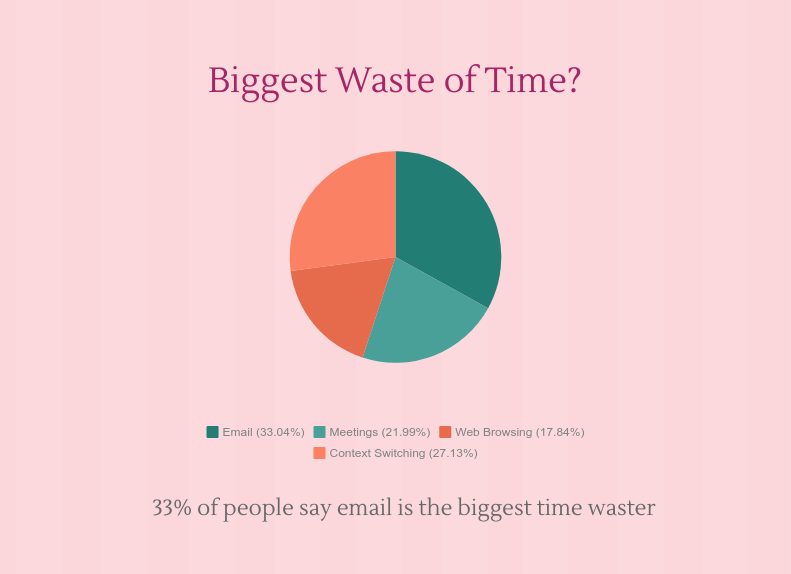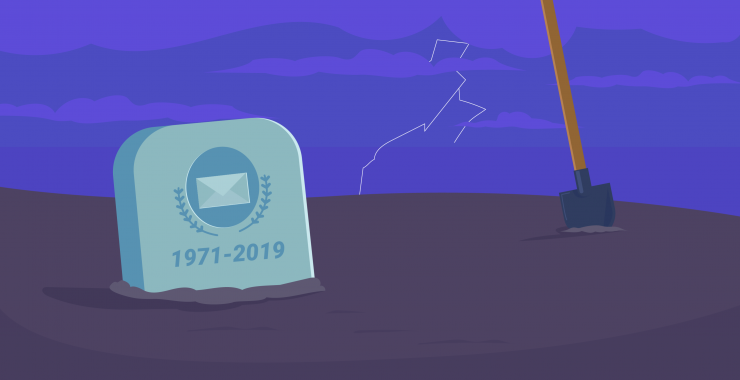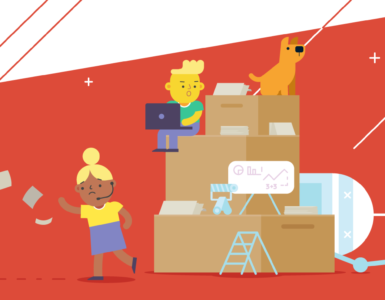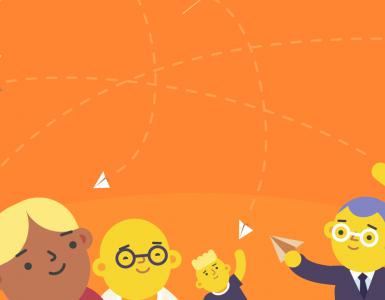In some shape or form, email has been around since as early as the 1970s. In the world of IT, where trends change every few months, four decades is quite a long time. According to the data on Statista, there were an astounding 4258 million email accounts in 2022.
While email usage remains high, the digital communications landscape is changing rapidly. The ‘death of email’ is a topic that is gaining popularity as businesses and individuals alike look for more efficient ways to communicate.
Even though it’s clear that email is the undisputed king of office communication, it’s also clear that it’s far from the ideal solution for communication.
As technology advances and new forms of digital communication emerge, people are increasingly questioning the email need. With the explosion of messaging apps, collaboration tools, and social media platforms, it’s no longer the go-to method for everyday business or personal communication. The question now isn’t just “What will replace email?” but “Why do we still use email?”
There are many options to choose from
If you wanted to communicate with someone just a decade ago, by far the most widely used option was email for business, with a few messenger solutions for personal use, such as MSN (yeah, I’m that old).
Nowadays, there are so many options to choose from that email is no longer the default choice for businesses. Apps and systems are developed every day, with specific communication channels and purposes in mind. When it comes to team communication in business, apps such as Chanty are quickly taking over.
The ease of use, a large variety of integrations, the ability to form groups and quickly exchange messages—these are all features that email is lacking in 2023 and that modern tech users are used to. Finally, apps like Chanty make it possible to easily search through all your exchanged messages, which can be a hassle with emails.
Pro-tip: Chanty has an unlimited message history for free, so you can chat and search to your heart’s desire.
Moreover, social media is booming as a way to communicate, and it shows no sign of slowing down. Besides exchanging messages with your friends, it’s not unusual to talk business through Facebook, Twitter, and especially LinkedIn, and each of these platforms is taking a slice of the messaging market from email. It’s also not unusual for people to schedule tweets to get their messages across.
These platforms are convenient for sharing digital business cards with relevant contact details for people to reach out. Granted, some of the benefits of email are lost (such as marketing automation, advanced segmentation, etc.), but for the most part, the pros outweigh the cons.
It’s getting crowded in our inboxes
One of the reasons why people steer clear of email is the fact that they rarely get the emails they want. Even though spam filters are getting better year after year, a whopping 45% of all emails are spam. Hoping to catch up with a potential client? Better wade through 20 offers for medication first.
Furthermore, email inboxes are often flooded with irrelevant newsletters, promotions, and routine updates that clog up the system. While filters can sort some of these out, they are still a constant drain on attention and time. This has led to a phenomenon known as ’email fatigue’, where users are overwhelmed by the sheer volume of messages they receive, making it difficult to prioritize what is most important.
According to research by Statista, the number of email users globally increased from 3.9 billion in 2019 to 4.4 billion in 2024. However, this growth in users hasn’t translated into better user experience. The rise in the volume of emails received is not met with better organization or relevant content, causing even more frustration for inbox users.
Then there are the emails that you get that you sort of want, but they’re still a nuisance. For example, you sign up for a service you actively use and love, and besides your regular transactional emails, you get a bulk of automated messages you are not interested in reading.

These unwanted emails often serve as a distraction from the more important messages that may require immediate action, creating additional layers of mental clutter. It’s not uncommon for people to miss important information simply because it’s buried under a pile of irrelevant content. This makes it increasingly difficult to manage your inbox effectively.
If you’ve ever gone somewhere using Booking.com, better prepare for a slew of messages about upcoming deals in cities you never even wanted to visit. The fact is, once they have your email, businesses will send you plenty of messages to stay top of mind, and you’re lucky if you can choose your preferences. In the worst-case scenario, you can unsubscribe.
But even unsubscribing doesn’t always work. Often, companies continue to send unsolicited emails, whether due to glitches in their systems or an unwillingness to fully honor unsubscribe requests. This creates a cycle where users feel powerless, and trapped in an endless loop of irrelevant content.
Finally, for business communication, email still seems to be a necessity. However, as anyone who’s lived through a colossal chain of CC and BCC emails can tell you, it’s far from ideal. It’s noisy, cluttered, and difficult to find the message you are looking for.
The upcoming generations aren’t too fond of email
When thinking about email in the future, most businesses focus their attention on generation Z—people born after 1997. Even though the majority of them are still not in the workforce, they soon will be and what’s more important, they outnumber millennials. Unlike millennials, they are among the first generations that didn’t adopt email as their primary mode of communication, which shows in their preferences.
As research has shown, generation Z considers email to be less important in their lives compared to millennials or members of generation X. Moreover, they are less likely to use email for work, compared to other polled generations. They seem to prefer it for personal emails sent from people they know outside of work the most, and then for communication with businesses.
This shift in communication preferences is not a passing trend. Generation Z is highly accustomed to fast, visual, and interactive forms of communication such as social media and instant messaging apps. Their digital-native upbringing has led them to embrace platforms such as WhatsApp, Instagram, and Snapchat, which allow for quick exchanges, multimedia sharing, and seamless interactions. These platforms are seen as more efficient and engaging than the formal, text-heavy nature of email.
As this generation gets older and enters the workforce, it’s certain to change the way email works, if not completely eliminate it as a means of communication. In the future, email will have quite a few competitors, including social media and apps that Gen Z-ers favor over email. In fact, it’s nowadays easier to capture their attention with great landing pages rather than emails.
Additionally, younger generations are increasingly aware of the inefficiencies of email, such as spam, delays, and the challenge of managing an overwhelming inbox. They prefer platforms that streamline communication and offer a more organized, user-friendly experience. This trend is forcing companies to rethink their communication strategies and opt for platforms that better meet the needs of a younger, more tech-savvy workforce.
It’s easier to get their attention these days with great landing pages than emails.
They take far too much time
Depending on your job type and habits, you’ll check your email about 15 times per day. That doesn’t sound all that bad, but it’s just the tip of the iceberg. As mentioned before, office workers get a ton of email – around 200 emails per day on average. Once you analyze what’s in your inbox, we find out that 144 out of those 200 are irrelevant to the recipient—they’re CCs, BCCs, transactional/promotional emails, etc.
 appfuence.com
appfuence.com
Do you know how much time you spend on emails at work every day? According to research, we spend about 2.5 hours every day checking and writing emails at work. That’s almost a third of a workday just spent on communication. Some other studies claim that we spend a whopping 6 hours daily on email.
It’s gotten so bad that many workers mute their emails for large portions of their day and minimize the time spent on managing their inboxes. Instead of facilitating work, email has become such a large part of work that it hinders productivity.
Team chat apps have the upper hand here, with options for task management and a wide range of integrations that make it possible to read messages without getting distracted and spending hours on endless strings of BCC emails.
Emails are a productivity killer
Once we receive an email, we usually read it within 6 seconds, while 85% of all emails are read within two minutes after they land in your inbox. In our chase to inbox zero, we’re quick to read and respond to emails, without thinking about the effects this has on our work and productivity.
With just a few seconds spent on each minute (ideally), you’re probably thinking that catching up with your emails immediately isn’t such a bad idea. The problem is, that your brain does not simply switch from one task to another without consequences. According to researchers, it takes up to 23 minutes to regain your focus after you interrupt one task with another (say, writing an article while reading an email). Multiply that with over 200 emails sent every day, and it’s a wonder that we manage to do anything at all with email taking us off our tracks.
The constant switching between tasks disrupts our flow state, a mental state in which we’re fully immersed in a task and working at peak productivity. This state is incredibly valuable for tasks that require deep thinking, such as writing or solving complex problems. Email forces us to constantly interrupt this flow, which slows down our overall performance and leads to mental exhaustion.
Another problem is the overwhelming nature of managing an inbox with hundreds of emails. Email overload leads to decision fatigue, where the sheer volume of emails forces us to make quick, often poor decisions about which messages to prioritize or even ignore. This reduces our ability to focus on more important work and can cause important tasks to slip through the cracks.
Frequent interruptions from email alerts have also been shown to have an impact on stress levels. Being constantly ‘on alert’ for new emails prevents us from having downtime during the working day. It is no wonder that many employees experience burnout as they feel the constant need to keep an eye on their inbox instead of taking meaningful breaks.
If you already must use email for a larger portion of your workday, set aside a certain time to read and reply to emails to avoid interruptions. Otherwise, you’ll end up doing two things poorly instead of multitasking efficiently. You can use apps like Shfit to manage your inbox quickly.
The death of email in the modern workflow
There was a time when email was the go-to for workplace communication. It was the go-to way for businesses to connect, share documents, and work together. But the modern workplace is changing, and so is the way we communicate. The rise of remote work, hybrid teams, and virtual collaboration has changed how we work a lot – and email is struggling to keep up. As businesses start using more flexible, connected ways of communicating, email is increasingly seen as a bit clunky and outdated.
One of the main reasons for this decline is that people are becoming more worried about the security of email. With all the phishing attacks, data breaches, and malicious spam, email just isn’t a reliable way to share sensitive information. The risks of unsecured email communication have led many organizations to look for more secure alternatives, such as encrypted messaging platforms or team collaboration apps with built-in security features.
But it’s not just about safety. In today’s fast-paced work environment, speed and efficiency are key, and email just can’t deliver. With global teams working across different time zones, it’s important to be able to communicate in real-time and respond quickly. Email can be a bit of a slow process. Messages can get lost in cluttered inboxes, responses can take too long, and the back-and-forth of emails isn’t always conducive to quick decision-making. Instead, businesses are choosing instant messaging, video calls, and project management tools that let teams chat instantly, without the lag of traditional email exchanges.
Another reason for this change is that more and more businesses are becoming more aware of environmental issues. As more companies try to reduce their carbon footprints, it’s becoming clear that email isn’t as green as we thought. With email systems storing and processing millions of messages a day, it’s no surprise that many are wondering how sustainable this method of communication really is. The energy consumption and waste associated with email servers are prompting businesses to look for greener alternatives. Cloud-based collaboration tools, for example, not only provide more efficient communication but are also viewed as more sustainable options in today’s eco-aware landscape.
Conclusion
Although we can’t predict the future of email with certainty, it’s clear that it’s lost its place as the main communication channel for individuals and companies today. In order to survive and thrive in the future, email will have to adapt to changes and new generations in the workforce, as well as stiff competition in the form of social media and messaging apps.
As businesses increasingly prioritize real-time communication, email’s limitations in terms of speed and flexibility are becoming more apparent. The advent of AI-powered tools, automation, and team collaboration apps also points to a future where email may simply be an outdated tool for many tasks.
While it’s not perfect, email still works and gets an incredible return on investment. It’s not going away any time soon, but it is evident that we are in need of a more efficient and modern communication method. The key question for organizations is not whether to abandon email altogether, but how to integrate newer communication channels to complement or even replace it in some contexts. Perhaps it is time for email to retire after more than four decades of being in use.
What are your thoughts on the future of email? Do you think it will be replaced by some other communication method? Do let us know in the comments!









Add comment